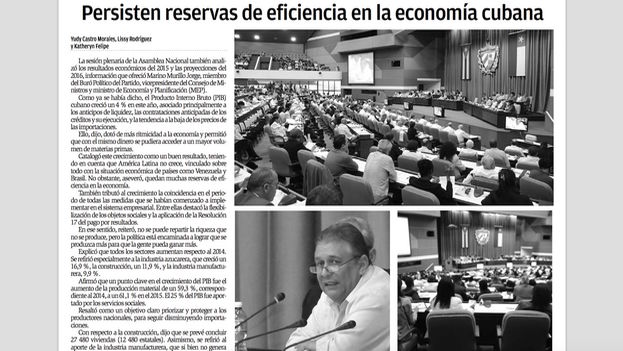
![]() 14ymedio, Reinaldo Escobar, Havana, 2 January 2015 – In the Cuban National Assembly of People’s Power final meeting of the year, the Minister of the Economy and the general-president himself coined a new expression. Both alluded to “reserves of efficiency” available to the Cuban economy to face the challenges of the future.
14ymedio, Reinaldo Escobar, Havana, 2 January 2015 – In the Cuban National Assembly of People’s Power final meeting of the year, the Minister of the Economy and the general-president himself coined a new expression. Both alluded to “reserves of efficiency” available to the Cuban economy to face the challenges of the future.
The optimistic tone of the phrase gives the impression that, starting now, the government can count on a secret weapon to guarantee the long-promised prosperous and sustainable socialism.
Whatever the accepted meaning of the term “reserve” might be, in its sense of “value that is saved for special occasions” it must always imply the willingness to conserve – at least what is included under this heading – the fruits of an unexpected surplus. We hear about a nation’s “gold reserves,” or its “water reserves” for times of drought, “fuel reserves” for a long trip, as well as “troop reserves” which are not mobilized until they are needed, along with “food reserves,” jealously stored for an emergency situation.
Efficiency, an abstract noun with practical implications, cannot be saved or set aside for another time. That which was not used, irretrievably disappears when an action concludes with unalterable results. How can a surgeon explain to the family of a patient who just died on the operating table that some quantity of efficiency reserves remain unused in the failed operation?
In cutting sugar cane, one of the indicators of efficiency is the height of the pieces of cane remaining in the ground. If they are very long, it is unthinkable to make another pass to recover the wasted cane; if they are cut too close to the ground the cane will not germinate again and a great deal of useless organic material will inevitably – and without recourse – contaminate the mass fed through the mill. In that case, the efficiency will be vaporized and no one will be able to argue that having left the stalk too long or too short represents reserves of efficiency to achieve a better crop for the next harvest.
Efficiency is a value that must be constantly renewed under new circumstances and attached to the unstoppable development of productive forces, as a Marxist faithful to the catechism would say. Unlike stagnant water in a reservoir, resources that have served to make work efficient today will not be equally useful for what we are going to undertake tomorrow.
Whomever tries to exhibit, with cheerful optimism, their supposed reserves of efficiency, can do so only to the extent they have been inefficient. It is a trick of linguistics. There are no reserves: there were only deficits.
